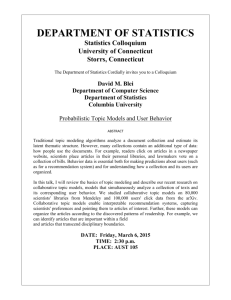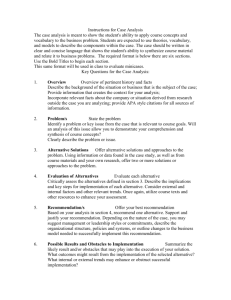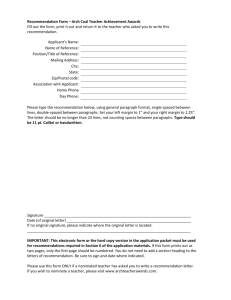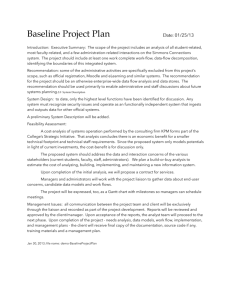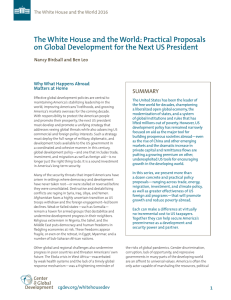Workshop 1 Report: Research for Innovation and Human and Social... Research for Innovation and Human and Social
advertisement
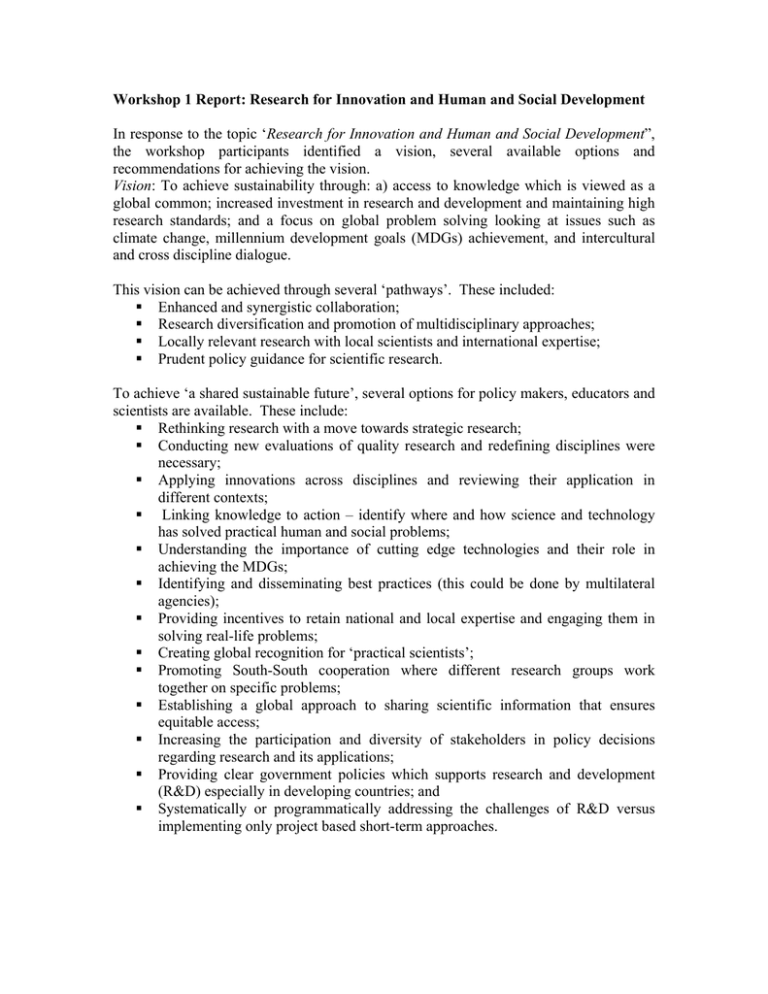
Workshop 1 Report: Research for Innovation and Human and Social Development In response to the topic ‘Research for Innovation and Human and Social Development”, the workshop participants identified a vision, several available options and recommendations for achieving the vision. Vision: To achieve sustainability through: a) access to knowledge which is viewed as a global common; increased investment in research and development and maintaining high research standards; and a focus on global problem solving looking at issues such as climate change, millennium development goals (MDGs) achievement, and intercultural and cross discipline dialogue. This vision can be achieved through several ‘pathways’. These included: Enhanced and synergistic collaboration; Research diversification and promotion of multidisciplinary approaches; Locally relevant research with local scientists and international expertise; Prudent policy guidance for scientific research. To achieve ‘a shared sustainable future’, several options for policy makers, educators and scientists are available. These include: Rethinking research with a move towards strategic research; Conducting new evaluations of quality research and redefining disciplines were necessary; Applying innovations across disciplines and reviewing their application in different contexts; Linking knowledge to action – identify where and how science and technology has solved practical human and social problems; Understanding the importance of cutting edge technologies and their role in achieving the MDGs; Identifying and disseminating best practices (this could be done by multilateral agencies); Providing incentives to retain national and local expertise and engaging them in solving real-life problems; Creating global recognition for ‘practical scientists’; Promoting South-South cooperation where different research groups work together on specific problems; Establishing a global approach to sharing scientific information that ensures equitable access; Increasing the participation and diversity of stakeholders in policy decisions regarding research and its applications; Providing clear government policies which supports research and development (R&D) especially in developing countries; and Systematically or programmatically addressing the challenges of R&D versus implementing only project based short-term approaches. In light of current global and local challenges for human and social sustainable development it is imperative that research and training consider the benefits of interdisciplinarity. Thus several recommendations can be made. These include: Recommendation 1: Develop new types of training methodologies and capacities for research applications Conduct assessments of what is required for development of research applications; Redefine research disciplines to support multi-disciplinary approaches; Consider re-orienting educational systems. Recommendation 2: Link high quality science to relevant local level applications (e.g. how can nanotechnology and biotechnology be applied to local problem solving). Recommendation 3: Emphasize socially relevant research and national evaluation systems – Socially relevant research should be prioritized and scientists encouraged to engage in problem solving; National systems of evaluating research and its application should be attuned to the social needs. Recommendation 4: Encourage collaboration between (i) industry and research institutions, (ii) south-south and north-south institutions, (iii) multilateral institutions – Industry, research and higher education institutions should look at how their collaboration, research and products can ‘service the poor’ in a manner that internalizes costs; Research institutions should look at different approaches to common problems and share in the lessons, best practices and replicable solutions; Multilateral institutions should collaborate when addressing local or national issues and at the national level multi-stakeholder problem solving should be encouraged. Recommendation 5: Academies of science and scientific communities should provide evidence-based advice to governments to inform policy making. Presenters: Hebe Vessuri, Senior Researcher and Head, Department of Science Studies, IVIC, Venezuela and Vice-Chair, Council of UNU Luc Soete, Director, UNU Maastricht Economic and Social Research and Training Centre on Innovation and Technology Shinichi Yamamoto, Director and Professor, Research Institute for Higher Education, Hiroshima University Mohamed H.A. Hassan, Executive Director, The Academy of Sciences for the Developing World Mary-Louise Kearney, Director of the Secretariat of the UNESCO Forum on Higher Education, Research and Knowledge


